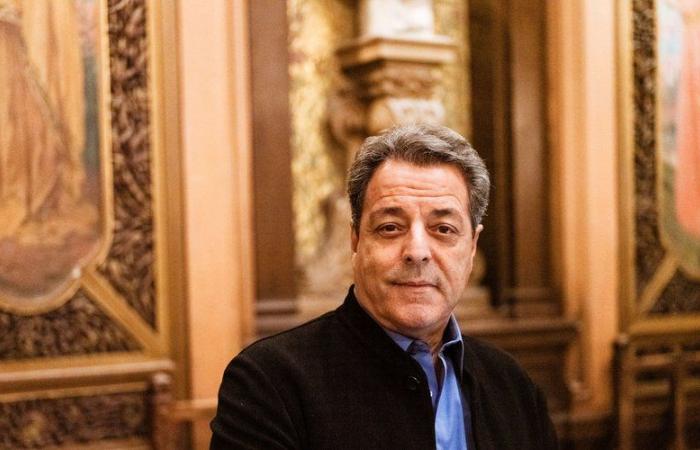
On December 17, at the Pams hotel in Perpignan, at the invitation of the Mediterranean Literature Center and the World Harmonies association, Chico Bouchikhi, former guitarist of the Gipsy Kings, and founder of the group Chico and The Gypsies, presented his autobiography: “Chico under the gypsy stars – My life with the gypsies” (Ed. Robert Laffont). An extraordinary destiny that he evokes in the columns of L’Indépendant.
This book tells us a lot about you. The first: you’re not a gypsy?
I present myself as a mosaic of cultures. I was born in France, to a Moroccan father and an Algerian mother (editor’s note: for civil status, Chico is Jahloul Bouchikhi) and I grew up with gypsies. I married a gypsy girl. I have children, grandchildren and great-grandchildren. At the time, I was told: “You’re in a bad place!” ». In fact, it brought me luck.
Was it easy to join a gypsy family?
It happened naturally. I was 12-13 years old. I was friends with the Reyes sons (editor’s note: including Nicolas, the voice of the Gipsy Kings), we lived in the same neighborhood in Arles. This family was extraordinary. The father, José, was the singer of Manitas de Plata. The mother, Clémentine, was generous and a real magician in the kitchen! I immediately felt good in this environment. I found a bit of the same values as mine: kindness, love. The Reyes were very modest but incredibly wealthy.
You just mentioned Manitas de Plata. What did he mean to you?
I listened to his music before I knew him. He showed us the way. Among the gypsies, he was the star: the one who was on TV, who shone and who, in a certain way, enlightened the community. In 1974, for his ten-year career, at the Théâtre des Champs-Elysées in Paris, he invited José Reyes and Los Reyes, of which I was a part, Hippolyte Baliardo and Los Baliardo. It was my first stage and my first TV since we had recorded for the show Noon Thirty by Danièle Gilbert. I was living a dream.
It was with the group Los Reyes that you performed in the 1970s and 1980s in Saint-Tropez and its region. Lean times to be around the jet-set?
They weren’t the lean cows. We were young, and even though we were begging and playing in restaurants, it was wonderful. And we met incredible people.
Including a certain Brigitte Bardot?
I met her in 1978, on her birthday. She became the godmother of the group. It’s a friendship that lasts forever. For the release of the book, she wrote me a letter in which she reminded me of all the anecdotes we shared.
In this book, you also explain that you are at the origin of the change of name of the group to become The Gipsy Kings. Why this decision?
I realized very early on, well before public success, that our music was international and that we needed an international passport. There are billions of Los Reyes groups in the world! When we went to play in New York, in private parties, we saw King Elvis Presley everywhere… and Burger King. So, I proposed Kings, the English translation of Reyes, and Gipsy for Gypsies. But at the start, no one wanted it: neither the family, nor the record companies!
1987, global success. Since then, you have played everywhere, in front of audiences from very different cultures. Many of your songs are now classics. What is the power of gypsy music?
Beyond the understanding of the words, it is the emotion that it gives off. Regardless of the country, people react to the same moment in the song. It is a universal language. And it is the voice of a people. For me, gypsy music is European blues.
Who says success, says turbulence. How did they lead to your ouster from the group?
Our producer at the time was very clever and we were very naive. One day, to defend our interests, I dared to ask him for the group’s accounts which did not correspond to the reality of our success around the world (editor’s note: to date, more than 25 million albums sold). I became the troublemaker and I was thrown out. But time has proven me right.
So in 1992 you founded your group Chico and The Gypsies. Where do you get this ability to bounce back?
I am an optimistic person. I have confidence in life. But I still think I have a lucky star (laughs).
In your incredible journey, however, there is an equally incredible tragedy: in 1973, in Norway, the assassination of your older brother by the Mossad, by mistake (editor’s note: Ahmed Bouchikhi confused by agents of the Israeli intelligence services with a Palestinian terrorist from the Black September group, responsible for the Munich massacre in 1972). Was Ahmed your model?
He was my idol. He was the Tintin of the family. He traveled a lot and each time, he brought us stories, music… He had just married a Norwegian woman, she was pregnant. His passing was a tragedy for our family. My parents died of grief. We never received an apology from Mossad…
Surprise of destiny: twenty years later, at the invitation of UNESCO, to celebrate the first anniversary of the Oslo Accords (editor’s note: Israeli-Palestinian peace treaty signed by Yitzhak Rabin, Israeli Prime Minister, and Yasser Arafat, president of the executive committee of the PLO), you are going to play in Norway. That evening, present in the hall are Shimon Peres, then Prime Minister of Israel, and Yasser Arafat, who will come to greet you after the concert. Did this moment change anything in you?
After Ahmed’s death, I blamed the whole Earth. But I also had values of peace and tolerance, which my parents had instilled in me. One of my brothers took a photo of this handshake. For me, this image has become a symbol of forgiveness.
In 1995, you were named “UNESCO special envoy for peace”. A commitment that will last twenty-five years. Looking back, are you proud of your entire journey?
Proud, no, but happy, yes. This book is not only a legacy for my children but it is also an example of life. It shows that you can start with “handicaps” and that ultimately it doesn’t matter… and that life is beautiful.
Chico takes part in the “Orchestra at the rumba school” of the Hélène-Boucher school group
Before presenting his book at the Pams Hotel, Chico came to meet the budding musicians. It has in fact been five years since Guy Bertrand, president of the World Harmonies association, created “the Orchestra at the rumba school” at the Hélène-Boucher school, in Haut-Vernet, in Perpignan, with the support of the National Association of School Orchestras and the Casa Musicale. This ensemble puts around thirty children, girls and boys around ten years old, in a learning situation, twice a week, with the singing and instruments characteristic of Catalan gypsy rumba. “This very specific project, which benefited from the support of the partners of the Town Contract, the Cité Éducative, could not exist without the investment within the school of Pauline Schmitt, the director, and Florent Guillaume, the referent teacher of the project, explains Guy Bertrand. Usually school orchestras are more oriented towards a classical aesthetic with strings and brass taught in conservatories. We wanted to innovate by offering a very different project based on living traditional music, Catalan rumba, and its instrumental, vocal and dance specificities. Most of the professional musicians of the Los Graciosos ensemble studied at this school and today they are passionate transmitters for the children of their neighborhood”.
Accompanied by Mario Cerviole-Bouchikhi, his son, and Abraham Maille, Chico listened attentively to the version I like you by Manu Chao in progress. Providing all their encouragement, Chico and his Gypsies sang the famous sway which made the Gipsy Kings successful.
“The transmission? I am a perfect example since my son is here with me, the souligné Chico. I found this approach to music and singing very interesting for children.” Chico very happy to be in Perpignan: “Some of us have family here. One of my sons was married to a woman from Perpignan. And musically, we knew the Tekameli well.”





